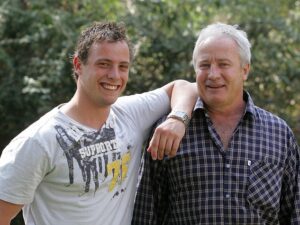Who is Oscar Pistorius?
Oscar Pistorius, a former professional sprinter from South Africa, was born with a congenital defect, missing the outside of both feet and both fibulae. At the age of 11 months, he underwent amputation of both feet. In addition to his athletic career, Pistorius gained notoriety as a convicted murderer.
Bio/Wiki
Age-37 years
Height- 1.60 m
Weight-81 kg
Full name- Oscar Leonard Carl Pistorius
Born-22 November 1986
Birthplace- Sandton, South Africa
Profession-South African former professional sprinter
Nationality-South African
Disability- Double below-knee amputee
Parents
Henke and Sheila Pistorius were the parents of Oscar. Sheila, a significant influence in his life, passed away when Oscar was 15 years old at the age of 43. Raised in a Christian household, Oscar has an elder brother named Carl and a younger sister named Aimée.


Girlfriend
Oscar Pistorius, the former South African runner who participated in both the Olympics and Paralympics, was involved with Reeva Steenkamp as his girlfriend. In 2013, he tragically shot and killed her. Reeva Steenkamp, who passed away at the age of 29, was a law graduate and accomplished model. Her professional endeavors included work as a TV presenter, and she gained recognition for her appearance on the reality show “Tropika Island of Treasure.”


Education
He enrolled in Constantia Kloof Primary School and later attended Pretoria Boys High School. At Pretoria Boys High School, he participated in rugby union as a member of the school’s third XV team. Additionally, between the ages of 11 and 13, he engaged in water polo and tennis at the provincial level.
Career
Early Career
Pistorius actively participated in Olympic wrestling at a local club and underwent training at Jannie Brooks’s garage gym in Pretoria. Brooks, his trainer, noted that it took six months for him to realize Pistorius “had no legs.” Despite this, Pistorius demonstrated proficiency in various exercises such as boxing, skipping, and press-ups.Following a significant rugby knee injury in June 2003, Pistorius turned to running during rehabilitation at the University of Pretoria’s High Performance Centre in January 2004, under the guidance of coach Ampie Louw. This transition marked a pivotal moment, and Pistorius, equipped with his first racing blades provided by South African prosthetist Francois van der Watt, never looked back. Initially facing challenges in finding suitable blades locally, Pistorius was eventually fitted with blades by American prosthetist Brian Frasure, through the Icelandic company Össur, after a referral from Van der Watt.
In 2006, Pistorius began pursuing a bachelor of commerce (B.Com.) in business management with sports science at the University of Pretoria. Despite joking about the extended timeline for graduation due to his training commitments, he expressed determination to finish his degree by the age of 30. When asked about his “sporting motto” in a June 2008 interview, Pistorius emphasized the idea that one is not disabled by their limitations but rather enabled by their abilities.


Professional Career
Competing in T44 (single below-knee amputees) events despite being classified in T43 (double below-knee amputee), Oscar Pistorius, often known as the “Blade Runner” and “the fastest man on no legs,” showcased his prowess. In the 2004 Summer Paralympics in Athens, he secured third place in the T44 100-metre event and clinched victory in the 200 metres with a world record time of 21.97 seconds.
In 2005, Pistorius, challenging nondisabled athletes, finished sixth in the South African Championships over 400 metres, setting a world record time of 47.34 seconds. He continued to break records, achieving a disability sports world record for the 400 metres (46.56 seconds) at the South African Senior Athletics Championships in 2007.
Invited by the IAAF to participate in his first international nondisabled event in 2005, Pistorius couldn’t attend due to school commitments. Despite setbacks, he competed in the 400 metres at Rome’s Golden Gala in 2007 and the Norwich Union British Grand Prix in Sheffield, facing challenges and scrutiny from the IAAF regarding the use of technical devices.
In pursuit of representing South Africa at the 2008 Summer Olympic Games in Beijing, Pistorius aimed to meet the Olympic “A” standard time for the individual 400-metre race. Despite a disappointing finish in the B race of the Notturna International in Milan, he continued to demonstrate his talent.
At the 2008 Summer Paralympics in Beijing, Pistorius set a Paralympic record in the heats of the 100 metres with a time of 11.16 seconds.
On August 4, 2012, during the 2012 Summer Olympic Games, Oscar Pistorius made history as the first amputee runner to compete in the Olympics. Additionally, he had the honor of carrying the flag at the opening ceremony of the 2012 Summer Paralympics on August 29. In the competition, Pistorius participated in the T44 classification for the men’s 100 meters, 200 meters, and 400 meters races, as well as the T42–T46 4 × 100 meters relay.
Murder of Reeva Steenkamp
On February 14, 2013, Oscar Pistorius fatally shot his girlfriend, paralegal, and model Reeva Steenkamp in his Pretoria residence. Pistorius claimed he believed Steenkamp was an intruder hiding in the bathroom. Subsequently, he was arrested and charged with murder. In the trial the following year, Pistorius was acquitted of murder but found guilty of culpable homicide. He received a five-year prison sentence for culpable homicide, along with a concurrent three-year suspended sentence for a separate conviction of reckless endangerment.
In 2015, Pistorius was temporarily released on house arrest while the case underwent an appeal presented to a panel at the Supreme Court of Appeal of South Africa. The court overturned the culpable homicide verdict and instead convicted him of murder. In July 2016, Judge Thokozile Masipa increased Pistorius’s sentence to six years. Upon the state’s appeal for a lengthier prison term, the Supreme Court of Appeal further extended the sentence to a total of 15 years.
Oscar Pistorius Granted Parole in South Africa
At 37 years old, Oscar Pistorius, the South African athlete, received a 13-year and five-month prison sentence in 2016. The parole board has scheduled his release for January 5, 2024. Upon release, Pistorius will be under authorities’ supervision until his sentence officially concludes. He must notify his parole officer for any change in residence or employment. Additionally, therapy sessions are mandatory, as confirmed by the Steenkamp family’s spokesman.


During the parole hearing, Reeva Steenkamp’s mother expressed concerns about Pistorius’s unresolved “huge anger issues.” Though she did not oppose his release, she questioned whether his time in prison adequately addressed these issues. Mrs. Steenkamp, who chose not to attend the hearing, mentioned the immense strain on her and her late husband, Barry, who passed away recently. Despite her doubts about Pistorius showing remorse, she had forgiven him long ago. This was Pistorius’s second parole hearing within a year, the first having collapsed in March due to an incomplete minimum detention period. South African law allows all offenders to be considered for parole after serving half their total sentence.











































